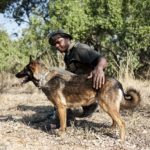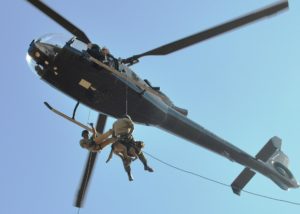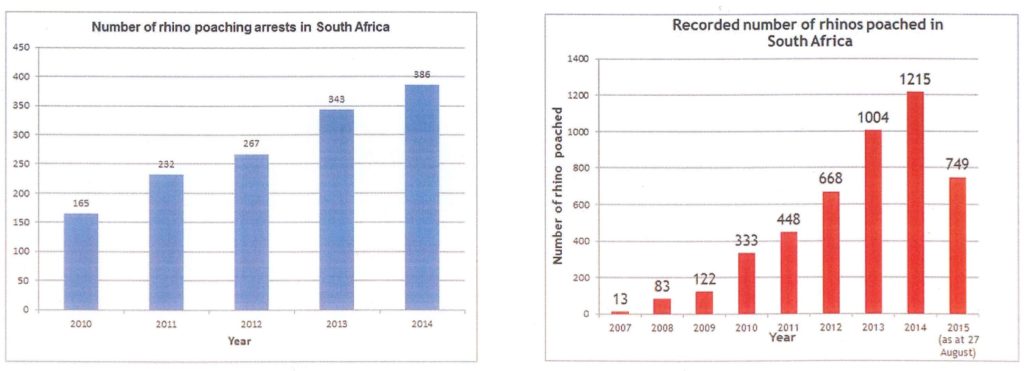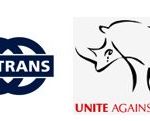As some of our followers might know, in July 2014, Medipet took up a “Save the Rhino” cause. We endeavored to lower our advertising spend and increase our sponsorship potential by investing in our wildlife heritage.
To this end we began sponsoring the anti-poaching rhino dogs under San Parks, who oversee the various conservation areas and parks that make up the bulk of our national reserves. Medipet is proud to announce that we currently sponsor around 57 dogs operating in the southern area of the Kruger National Park and Sabi Sands Game Reserves.
Earlier this week, one of those dogs was thrust into the limelight, and recognised for his outstanding achievements in the war against poaching. Meet K9 Killer, the Belgian Malinois who, so far, has the highest success rate in tracking poachers (115 over the last 4 years).
Killer is just one of many dogs based at the KNP K9 Unit. There, dogs undergo intensive training programs before being deployed, with their handlers. There are two Centres that support the Greater KNP Anti-Poaching Initiative – the KNP K9 Centre based in the south of the Park and the Southern African Wildlife College K9 Centre based in the Central region, in the contractual portion of the park.
The dogs most commonly used are the Malinois, the Bloodhound and the Fox Hound, given their superior tracking and olfactory skills.
They often work in extreme conditions, depending on the season. Optimal temperatures for the working dogs are below 30 degrees Celcius, but summer temperatures can soar much higher, so the handlers have to ensure that the dogs are rested and hydrated.
Currently, when poaching activity is suspected, or poachers are spotted, the dogs are deployed by helicopter to the incident area, they and their handlers are dropped and track on foot from there. Richard Sowry, a KNP Section Ranger who is involved in the SA Wildlife College K9 Centre says that “Ideally, we are working toward the dogs tracking freely, wearing GPS collars so helicopters and assault teams can follow and keep up. Plans are in place to implement this project out.”
A typical day in the life of a ranger dog might involve daily patrols, jumping into and out of helicopters, working in the field tracking spoor, or on the gates at the many entrances and exits to the KNP, or even being exercised or rested on rotation. They have to be kept in peak physical condition, so veterinary care is of utmost importance. The following interview with Bruce Leslie, Regional Ranger and Johan de Beer, San Parks Dog Master, highlight a day in the life of these wildlife champions.
The numbers of rhino poached in recent years has escalated dramatically, meaning that the fight to protect our iconic species has intensified in response. Stats released by the Department of Environmental Affairs show that a record number of rhinos were killed in South Africa in 2014, due to poaching.
That number, totaling 1215, equates to 1 rhino killed every 8 hours. As of August 2015 the number of rhino deaths sat at 749, (544 of these poached in the Kruger National Park). We have no figures from August to December 2015, but the graph’s drop in number indicates a significant spike in the efficacy and success of the anti-poaching units, with increased rhino related arrests. Last year Richard’s team were responsible for the arrest of 29 poachers and the confiscation of 18 firearms.
This problem however is not just endemic to South Africa, rhino’s are endangered on a global scale. Testament to their plight is the number of celebrities who have lent their names to the cause.
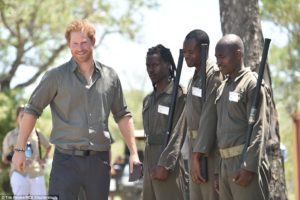
Prince Harry in the field with student rangers from the SA Wildlife College. Image courtesy of The Daily Mail
The likes of The Parlotones, Prince Harry, Ricky Gervais, Mark Boucher (and SAB) and David Beckham are some of those making use of their celebrity status to raise awareness and funds in the ongoing fight.
And that’s not all, big business is doing their part too, Unitrans, WWF, Nedbank, Hills Pet Nutrition, Medipet, ROGZ, Bayer and Mechem are just some of the names partnering up with KNP to bring a stop to the staggering slaughter of our national heritage. Unitrans has been instrumental in bringing an idea to fruition. Says Richard, “Unitrans have been a huge sponsor of the Unite Against Poaching initiative, which got us started with the hound projects, they have donated a few million to the cause.”
Lets also not forget the schools initiatives where local schools across South Africa raise funds for the rhinos, the kids who donate their pocket money, or host bake sales; every single cent counts, and brings us closer as humans when we stand together to protect a species undeniable right to survival.
In this PDSA video clip, we see Prince Harry heading out, once again, to SA to meet Killer, and Ricky Gervais, animal ambassador, awarding the medal on behalf of the PDSA.
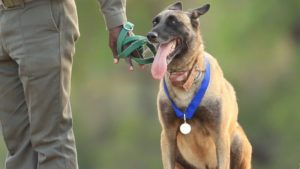 Well done Killer, and all the dogs being trained and utilised, and a special mention for the handlers of these uniquely brave animals. Keep up your good work and thank you from all South Africans, we are indebted.
Well done Killer, and all the dogs being trained and utilised, and a special mention for the handlers of these uniquely brave animals. Keep up your good work and thank you from all South Africans, we are indebted.

